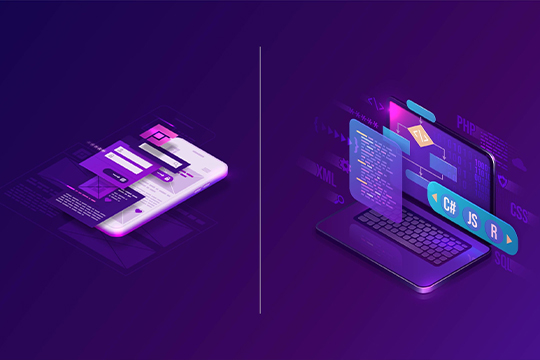Selecting between native and web applications is a critical decision that enterprises must make. Each of the solutions has pros and cons of its own, so you need to know which option best fits your business objectives. Let us examine the main distinctions between native and web applications in this blog.
Applications that are native are made especially for an operating system, like Android or iOS. These applications are renowned for their superior usability, great performance, and access to device-specific capabilities like notifications, GPS, and cameras. However, since you might have to make unique versions for various platforms, creating native apps can be more expensive and time-consuming.
Conversely, web apps are not operating system-specific and may be accessed using web browsers. This increases their reach and simplifies maintenance because they can operate on any internet-connected device. Web applications can be developed more quickly and affordably because only one platform-compatible version needs to be created. They frequently do not have access to device-specific functionality, and they might not offer the same degree of performance and user experience as native apps.

Understanding Native App And Web App Development
A native app: what is it?
Software designed for a particular platform, such as iOS or Android, is called a native app. It may use the hardware on your device because it is installed right there, improving performance and facilitating a seamless operating system integration. Native apps, which you often acquire from app stores, might come with features like push notifications and offline access.
What is a web application?
A web application can be accessed via an internet browser and doesn’t require installation on your device. It is compatible with any device that has a web browser because it is built using web technologies including HTML, CSS, and JavaScript. Web apps are easily updated and accessible from a variety of devices and operating systems because they are hosted on remote servers.
Factors Business Owners Should Consider
Business owners should weigh a number of important considerations when choosing between native and online applications. Assess your target market first. Web apps are more widely accessible across platforms, but native apps offer better performance and user experience. Next, think about development time and budget: web apps are more affordable and deploy faster than native apps, which are more expensive and require more time to develop.
Evaluate whether any device-specific features are necessary as well. Full access is available to native apps, which are necessary for several features. Finally, consider upkeep and updates:
Web apps are perfect for companies looking for simplicity and efficiency because they require less maintenance because they update automatically.
Comparison Table: Native vs. Web Application
| Feature | Native Application | Web Application | For Business |
| Performance | High | Moderate | Native, for performance-critical apps |
| User Experience | Excellent, with smooth and responsive UI | Good, but can vary based on browser | Native, for superior user experience |
| Access to Device Features | Full access to device-specific features | Limited access via browser APIs | Native, for apps requiring device integration |
| Development Cost | Higher, due to separate versions for each OS | Lower, single version for all platforms | Web, for budget-conscious projects |
| Development Time | Longer, need to build for multiple platforms | Shorter, single build | Web, for faster time-to-market |
| Maintenance | More complex, updates required for each OS | Easier, single update for all users | Web, for simpler maintenance |
| Offline Capability | Strong, works without internet connection | Limited, requires internet access | Native, for offline functionality |
| Reach and Accessibility | Limited to specific OS and device | Broad, accessible on any device with internet | Web, for wider audience reach |
| Installation | Requires download from app store | No installation, accessed via browser | Web, for easy access without installation |
| Updates | Users need to download updates | Automatic updates without user action | Web, for seamless updates |

What are the advantages of native apps?
- Native Applications Function Best
When developing a native mobile app, the application is tailored to run on a particular platform. Consequently, the application exhibits a very high degree of performance. Because native apps are designed for a particular operating system and are created using the platform’s primary programming language and APIs, they are incredibly responsive and quick.
- Native Applications Are Safer
Web applications depend on many browsers and supporting technologies including CSS, HTML5, and JavaScript. Creating a native mobile application is an excellent approach to provide dependable data protection for your users.
- Native Applications Are Easier To Use And More Interactive
In particular, native mobile apps function better when it comes to user input and output. These apps appear and feel like they are an integral component of the device since they inherit the operating system interfaces of their respective devices. The enhanced user experience offered by native mobile apps is by far its greatest advantage.
What are the advantages of Web apps?
- Economical
The pricing factor is one of the most alluring benefits of developing web apps. The cost of the web development services needed to do this is far less than that of other web developments. Development time is significantly reduced because all that needs to be done is create linkages between the URL and the application. For the owner, this means that altogether, it’s a cost-effective endeavour.
- Constantly updated
They don’t need to be updated as frequently as popular apps do. The most recent version of the program is updated on the website/URL that it is directly linked to. Additionally, all users always use the most recent and identical version of the web application as they are all accessing it through the same URL.
- No Requirement to Download
The user may interact with apps directly through a web browser, so there’s no need to install or download them separately from places like Google Play or the Apple App Store. Because there is no fee associated with having a direct link through a web app, this also saves money. Additionally, web apps can be used on a variety of platforms, including desktops, laptops, and mobile devices, and accessed through a variety of browsers.
Which is your top priority?
Selecting between native and web apps comes down to more than just technical considerations; it also comes down to money, audience requirements, and goals alignment.
Generally speaking, native apps may be the best option if you want to offer a rich user experience and require more control over the features, UX, and design elements.
However, a web app—especially a progressive web app—might be a superior option if you’re searching for an accessible platform with a more affordable overall budget and shorter development time. Web apps are also suitable for feature sets and business goals that are comparatively basic.
If your company needs superior user experience, fast performance, and deep integration with device-specific capabilities, go with native applications.
If you require a more affordable solution with quicker development times, simpler maintenance, and increased reach, go for web applications.

Ndimension Labs is developing online and native apps that are suited to your company’s requirements. Your app will stand out in terms of functionality, performance, and user experience thanks to the efforts of our talented team of developers and designers.
With native apps, we provide full development services for the iOS and Android operating systems. Our professionals make the most of platform-specific capabilities to create high-performing apps that offer smooth and interesting user experiences. Whether you require an enterprise solution or a consumer-facing app, we make sure it seamlessly connects with device capabilities to guarantee optimal responsiveness and performance.
We take great satisfaction in developing scalable, secure, and cross-platform web applications. Our web apps have a wide audience because they are made to function on any device that has an internet connection. Utilising the newest technology, we develop applications that are responsive, load quickly, and offer a consistent user experience across various browsers and devices.
Are you prepared to turn your concept into an effective application? To discuss your project and learn how we can assist you in achieving your business objectives, get in touch with us right now. visit begin, go visit our contact page.





